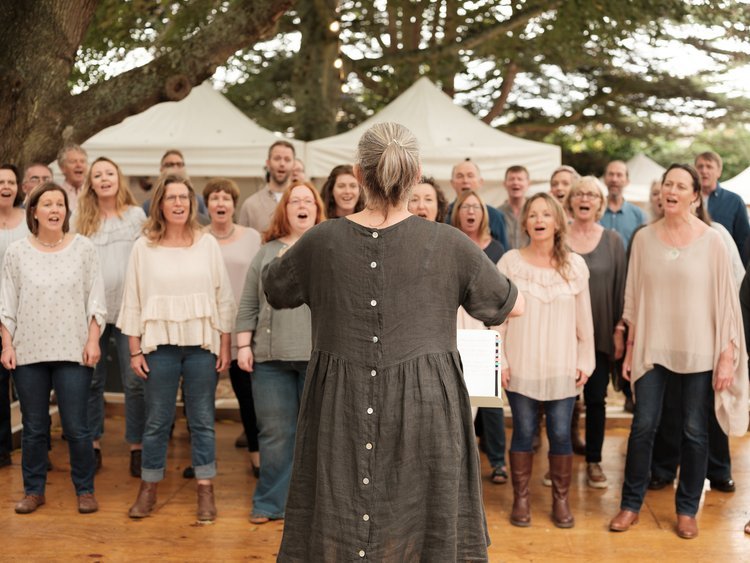
choir coaching
Create a unified & cohesive sound
light up your audience
There is a one particular sound, a true, resonant ring that is the elusive quality in choral singing and it takes a special group of people to sing in a way that is truly unified and resonant. This is the sound that lights up an audience with the sheer quality of the singing. Tuning, timing, articulation and vowel shape all play a vital part in creating it.
Amateur choirs and their choir leaders up and down the country are striving for improvement through competitions and performances, some with help, others feeling a little lost not knowing how best to improve their singers and their sound.
Choir singers often come to choir with snippets of information about breathing and vocal projection that are at best, confusing for them and often, woefully inaccurate. It can make singing jolly hard work for them and often leave them hoarse and certainly making them feel like they aren’t singing their best. That can be a huge challenge for their choir leader.
Choir coaching helps your singers by getting them to use the same techniques as each other, thereby creating a unified and cohesive sound.
Choir coaching is there to help develop the skills of ALL the choir.
Sandra loves working with singers who want to learn and are eager to improve their own sound, as well as that of their chorus. The two go hand in hand. We have to develop the individual, to develop the choir. Giving your choir the very best tools to learn and improve their singing gives them enormous satisfaction.
It is important to remember that the MD needs some love, too! MD’s need to constantly update and develop their own skills and understanding of how to get the best from their choirs. Because Sandra runs her own choir, The Lost Sound, she can help the leaders, as well as the singers. She understands how to plan a choir session, develop key vocal techniques, good programming of songs for concerts, and she can help coach your ensembles. She can also provide some back up notes for you to help future rehearsals.
Get in touch and chat to Sandra to see how she can help your singers and choir
read more
-
Sandra teaches with a full knowledge of the physical and vocal anatomy that is needed to provide a safe technical base see safe singing practices. Giving a thorough, practical and anatomically correct explanation can be amazingly liberating for many singers who find they have misunderstood concepts of vocal technique and breathing. When choir coaching, Sandra is very happy to explain any other issues that your singers need to understand in order to get the big picture!
Whatever your choirs style of singing, whether it be classical, barbershop chorus, community choir, world music or folk choir, the singing and breathing techniques that Sandra teaches can bring out the best in your singers and your style of music, by enhancing its essential quality and character.
Does your choir have key problems with:
Tuning of chords
Holding pitch through song
Flagging vocal energy mid song
Lack of expression and vitality in performance
It does take time for a singer to change their habits, as all MD’s know – but giving your singers the best possible foundation, enables them to gain confidence in how they sing and the quality they can produce.
The 2 fundamentals to establish for your singers that will support everything they need to do are:
1) Breath control
2) Forward Placement of the voice
Working on these 2 key components helps your singers move between registers, stay in the same vocal colour as they go up the scale (i.e. they don’t go breathy as they get higher) and absolutely improves the ringing of every chord.
-
So many issues with improving a choir’s sound stem from how the singers breathe. Interestingly, that’s also the part that singers are keen to rush over! Sandra starts with a good, solid breathing foundation. Without good breath control underpinning a singer, they struggle to hold pitch, control phrasing or maintain vocal energy. Without vocal energy, they will probably also be struggling to produce an expressive performance. When singers can feel the effort in their singing, they worry. When they worry, they aren’t projecting out, but are inwardly awkward and overly aware of the strain.
Sound familiar?
Learning and understanding what ‘good singing breathing’ really is and how to maintain it, can improve your choir’s tone colour, agility, range and projection. It will also help them control nerves in performance and help them stay relaxed and energised in rehearsal.
Establishing a free flowing breath will then enable the throat to open and the placing of the voice to fall forward. Forward placement of the voice creates a warm, full tone and greatly enhances projection and power in your singing. If your singers are having trouble blending and you experience voices jutting out through the mix, then getting placement right can make a huge difference. Correct placing also helps a singer move through her/his range easily, for example, through the chest voice bridge, a particularly difficult shift for a lot of female singers and for the men, into falsetto.
The overall ‘tonal phrasing’ is improved, where you are maintaining the tone evenly throughout the phrase, as there is no strain and the singers ranges become more agile, flexible and extended. Placement can also help with fine tuning as more of the note ‘rings,’ producing more lock in the chords.
It does take time and repetition and with the correct warm up exercises, you will notice how your choir improves
-
Sandra can fully explain, demonstrate and instruct your singers in how to improve the two key points of breathing and placement and help devise a warm-up that will support the learning of the techniques. It is worth building this into every warm-up.
Building an effective warm-up
A good warm-up routine can:-
Prepare and guide your singers from their work day mind into a creative singing frame
Greatly enhance your productivity in rehearsal by preparing the singers for the techniques needed in the song
Deepen vocal and breathing skills for your chorus so that the overall standard of your choir rises
Create a cohesive group ready to concentrate and work well together.
Sandra can devise a solid warm-up for your choir incorporating:-
Physical exercises – strengthening posture and presentation
Breathing techniques – diaphragmatic exercises and breath support and flow
Vocal techniques that can support and develop your singers.
Exercises to work with tuning, blend, vocal energy.
Understanding WHY we do the exercises
How many times are you using an exercise with the chorus but have forgotten why you use it or unclear how to improve it?
Sandra will clearly explain the focus and function of each exercise and you will feel confident to use the exercises with your choir or chorus, as you will understand the purpose of the exercises and what results to expect.
Most amateur choirs need to keep their skills practiced in each session. If certain exercises or skills aren’t used for a while, expect to remind your singers! The more you repeat it, the more it will go in. Building these skills into every rehearsal via your warm-up routine will instil good practice into your singers and help them create the warm vibrant sound that you want to hear.
If needed, Sandra’s choir coaching can also help with your overall rehearsal structure and strategy. Each group or choir is likely to have different coaching needs, as well as different time-scales and resources available – therefore talk to Sandra about what you need.
Sandra has completed the LABBS Judges foundation course and regularly attends Barbershop training days. She is also a member of Sing A cappella and The Natural Practitioners Network
Sandra is always available for choir coaching (she loves it!). She can run evening sessions, longer 5/6 week courses and all day sessions for your choir.
“I was one of the lucky Kingsmen to attend your coaching yesterday. Thank you for the excellent information and techniques you shared with us. Your light touch, easy style and humour enabled all to connect with you and engage with all that you were presenting to us.”
Singer - The Kingsmen Barbershop Chorus, Devon

